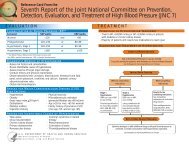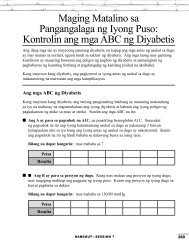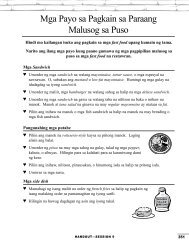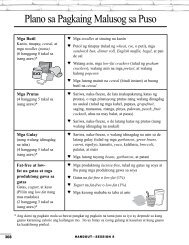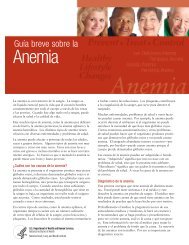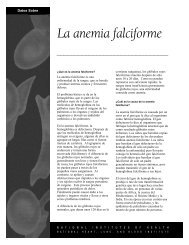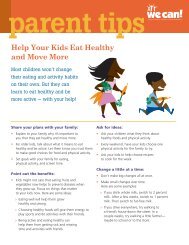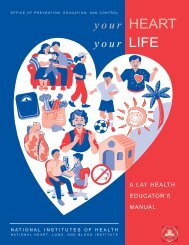HeartsNParks Community Mobilization Guide - National Heart, Lung ...
HeartsNParks Community Mobilization Guide - National Heart, Lung ...
HeartsNParks Community Mobilization Guide - National Heart, Lung ...
Create successful ePaper yourself
Turn your PDF publications into a flip-book with our unique Google optimized e-Paper software.
F-6<br />
low-fat or fat-free dairy products and to<br />
remove skin from poultry.<br />
• Cholesterol in the diet also can raise blood<br />
cholesterol. It is found only in foods from<br />
animals. Meat and poultry have similar<br />
amounts. Since eggs are especially high in<br />
cholesterol, limit intake to four eggs per week.<br />
• Unsaturated fat does not raise blood cholesterol<br />
but can add calories. Be careful of extra<br />
calories when trying to lose weight.<br />
• Another key to healthy eating is choosing<br />
foods lower in salt and sodium, which can<br />
affect blood pressure. Have no more than<br />
2,400 mg of sodium a day—equal to about<br />
one teaspoon of table salt. This includes salt<br />
used in cooking. Instead, season food with<br />
herbs and spices. Also, snack on unsalted<br />
pretzels, popcorn without salt or butter,<br />
and crackers or fruits.<br />
• Having an adequate intake of vitamins and<br />
minerals, especially potassium, calcium, and<br />
magnesium, also is important for lowering<br />
blood pressure.<br />
• Limit alcohol, since it supplies calories but<br />
few or no nutrients—for example, no more<br />
than two 12-ounce beers in a day for men<br />
and one for women.<br />
• To help you follow a heart-healthy eating<br />
plan, read food labels to choose foods that<br />
are lower in calories, total fat, saturated fat,<br />
and sodium.<br />
Special Tips for<br />
Kids and<br />
Seniors<br />
American children<br />
are gaining weight.<br />
They are eating too<br />
many calories from<br />
high-calorie fast- and<br />
snack foods and not<br />
getting enough physical<br />
activity. Try cutting<br />
back on high-fat foods<br />
for your children by<br />
offering more fruits as<br />
snacks. Vegetables can<br />
be chopped into small<br />
pieces and added to favorite recipes without<br />
kids noticing. Combine rice with vegetables.<br />
Whole wheat or bran breads add fiber to<br />
sandwiches. For desserts, offer fig bars,<br />
ginger snaps, graham crackers, or frozen<br />
fatfree dairy desserts.<br />
Children often eat many meals away from<br />
home, making it harder to maintain good<br />
eating habits. To improve fast-food meals,<br />
order a small plain hamburger—it has less fat<br />
than fried or battered items—and hold the<br />
cheese or special sauce. Or, try lean roast<br />
beef and grilled or broiled chicken sandwiches<br />
or pita pockets with small pieces of meat and<br />
vegetables.<br />
Seniors need to be diet-smart too.<br />
Maintaining a healthy body weight is important<br />
for older people, since we begin to lose<br />
weight as we age. Some weight may be lost<br />
from muscle, so be sure that your diet is rich<br />
in protein and carbohydrates while watching<br />
out for too many saturated fats.



